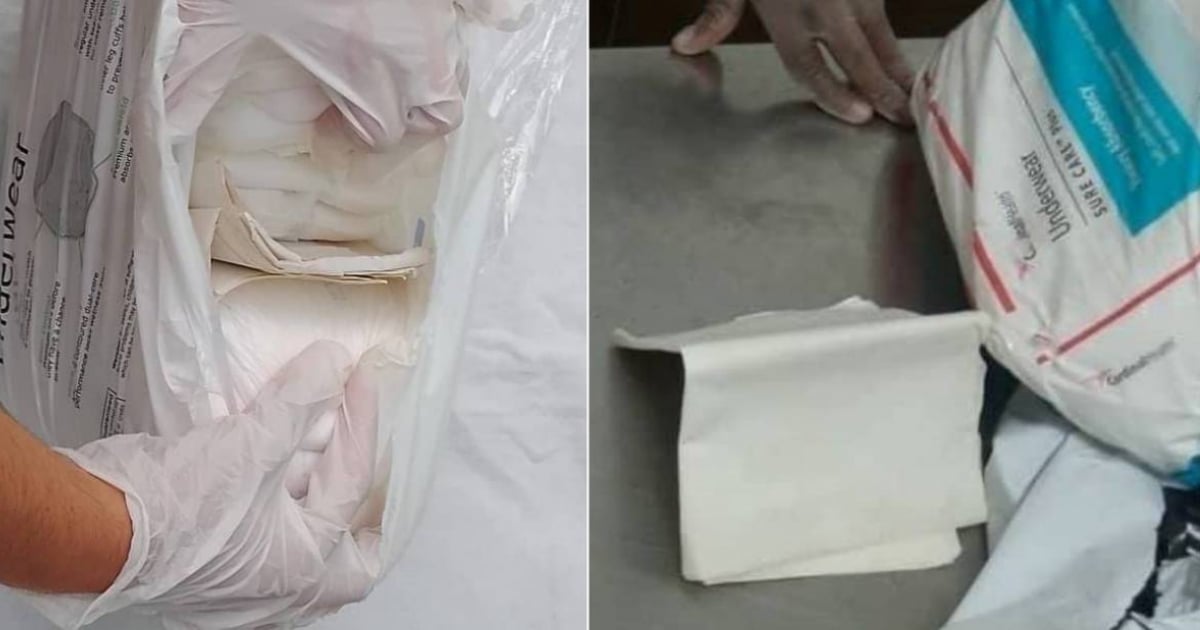
Related videos:
The General Customs of the Republic of Cuba reported this Thursday on the detection of an international drug trafficking operation, after intercepting a package from the United States at the José Martí International Airport in Havana that contained papers soaked with prohibited substances concealed in disposable diapers.
According to a statement posted on the social network X by the first deputy chief of Customs, William Pérez González, the discovery was made possible thanks to a joint operation with specialized forces from the Ministry of the Interior (MININT).
"The unity and intelligence of the joint actions between the Cuban Customs and the anti-drug agency of the MININT allowed for the detection of 31 sheets of paper soaked with drugs, synthetic 'chemical' cannabinoids, hidden in diaper packages from the U.S. at the Havana airport," explained the official.
Cuban authorities indicated that the operation is part of the actions of the Drug Prevention and Combat Exercise aimed at strengthening border controls.
The Customs authorities reiterated that they maintain a Zero Tolerance for Drugs policy and assure that they will continue their efforts in detecting and combating drug trafficking in all its forms.
Last week, Cuban customs authorities reported an increase in the entry of drugs into the country by air. The most common method is the use of "blind mules", individuals who sell space in their luggage to carry packages to Cuba, but unknowingly transport narcotics.
Isnavis Chacón, head of Customs at the "José Martí" International Airport in Havana, warned that travelers are solely responsible for the items they carry and encouraged them to think twice about whether it is worth the decision to carry packages in exchange for money.
In recent months, numerous cases of people under the influence of drugs have been reported on the streets of Cuba. The use of “El Químico” has raised concerns due to its devastating effects on the physical and mental health of young people.
Cuban doctors explained that it is a substance belonging to the group of synthetic cannabinoids, designed to mimic the effects of marijuana, but they are much more potent and dangerous.
Frequently Asked Questions about Drug Trafficking in Cuba
How did the Cuban Customs detect drug smuggling in diapers?
The Customs of Cuba detected drug trafficking in diapers through a joint operation with the Ministry of the Interior (MININT). They intercepted 31 sheets of paper soaked in synthetic cannabinoids hidden in disposable diapers coming from the United States. This discovery is part of the reinforced control measures at José Martí International Airport in Havana.
What is the "Zero Tolerance for Drugs" policy in Cuba?
The "Zero Tolerance for Drugs" policy in Cuba entails a strict and rigorous approach to preventing and combating drug trafficking and use. Cuban authorities have intensified control operations at airports and key areas, and have implemented exemplary trials to deter drug trafficking. This policy also aims to educate the population about the risks of consuming illicit substances.
What legal consequences do those involved in drug trafficking face in Cuba?
In Cuba, individuals involved in drug trafficking face severe legal consequences. Sentences can range from 4 to 30 years in prison, life imprisonment, or even the death penalty in aggravated cases. Authorities have strengthened their focus on the application of exemplary trials and the confiscation of assets related to drug trafficking.
What is the impact of "El Químico" consumption on Cuban society?
The consumption of "El Químico," a synthetic cannabinoid, has raised significant concern in Cuban society due to its devastating effects on young people. This drug is much more potent and dangerous than marijuana, causing severe consequences for both physical and mental health. Authorities have intensified efforts to combat its distribution and use on the island.
Filed under: